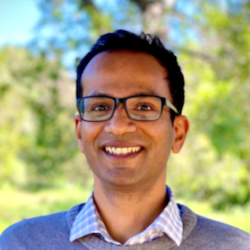Graduate Student Seminar
February 14, 2025
10:00 a.m. ET
McConomy Auditorium, First Floor Cohon University Center
February 14, 2025
10:00 a.m. ET
McConomy Auditorium, First Floor Cohon University Center
Integrating dissimilar semiconductors on a single crystal platform can power the next generation of electronics and photonics applications. In such a platform, semiconductors like III-V and IV-VI materials bring exciting new properties to the table and leverage the scale and functionality of conventional silicon technology. The synthesis of high-quality semiconductor thin films while mediating this dissimilarity, however, is quite the materials science challenge. These very differences in properties also lead to unusual interfaces and crystal defects such as dislocations that severely degrade device performance. In this talk, we update our understanding of how dislocations are bad for epitaxially integrated telecom lasers on silicon using new microscopy and microanalysis tools, and we present on our progress in engineering dislocation tolerance in such devices using MBE-grown III-V (InAs) quantum dots. With an eye towards materials and devices naturally more tolerant to dislocations, we will show new opportunities that arise from MBE-grown IV-VI (PbSe-SnSe) mid-infrared light emitters and crystalline-crystalline phase change materials grown epitaxially on III-V substrates.

Mukherjee's research interests are in compound semiconductor thin film synthesis and defect science. Prof. Mukherjee received his B.Eng. in Electrical Engineering from Nanyang Technological University in Singapore, M.S. from the National University of Singapore, and his M.Eng. and Ph.D. from MIT in Materials Science and Engineering. Before joining Stanford, he has been an assistant professor in the Materials department at UC Santa Barbara (2016-2020) and has held postdoctoral appointments at IBM and MIT. His work on epitaxy and crystal defects has been recognized by a NSF CAREER award, the Corbett Prize at the International Conference on Defects in Semiconductors, the Young Scientist Award of the 2023 International Symposium on Compound Semiconductors, and the Young Investigator Award at the 2024 North American Molecular Beam Epitaxy conference.
February 13 2026
10:00 AM ET
Materials Science and Engineering
Interfacial Fracture in Soft Polymer Networks: Revisiting Gent's Picture, presented by Gabriel Sanoja Lopez, University of Texas, Austin
CUC McConomy Auditorium
February 20 2026
10:00 AM ET
Materials Science and Engineering
High-Fidelity Atomistic Simulations of Chemistry-Microstructure Interactions in Metals, presented by Rodrigo Freitas, Massachusetts Institute of Technology
CUC McConomy Auditorium
February 20 2026
5:30 PM - 9:30 PM ET
Highmark Center for Health, Wellness and Athletics (100 Tech St, Pittsburgh, PA 15213)
February 25 2026
2:00 PM ET
Faculty Insights with Mario Berges
Please join us for CMU Engineering's virtual program, “Faculty Insights: A 20 Minute Briefing.” In this series, faculty will share insights into their research, its impact, and provide perspective for the future of the field.
Virtual, link provided to registrants
February 27 2026
10:00 AM ET
Materials Science and Engineering
AI meets Peer Review: The Good, The Bad, and The Ugly, presented by Nihar Shah, Carnegie Mellon University
CUC McConomy Auditorium
March 13 2026
10:00 AM ET
Materials Science and Engineering
presented by Rachel Goldman, University of Michigan
CUC McConomy Auditorium